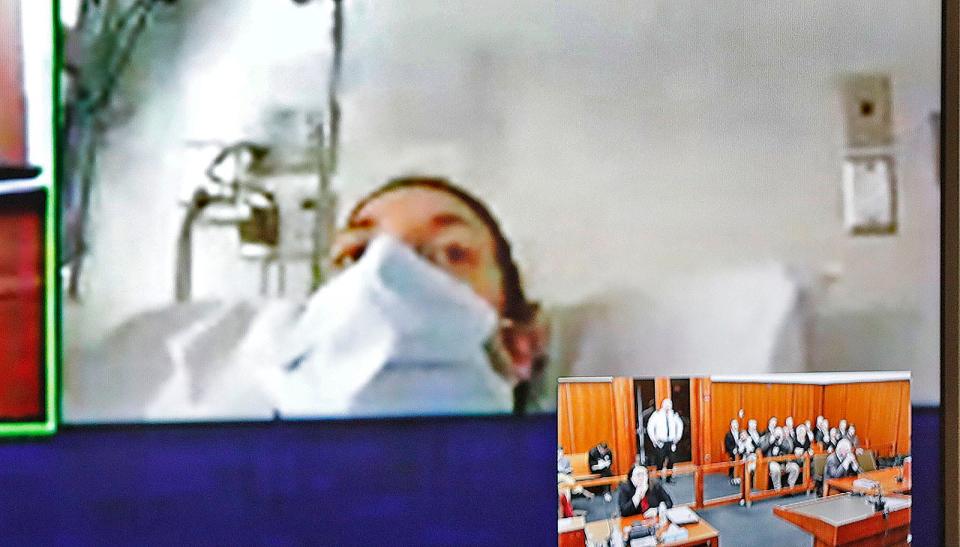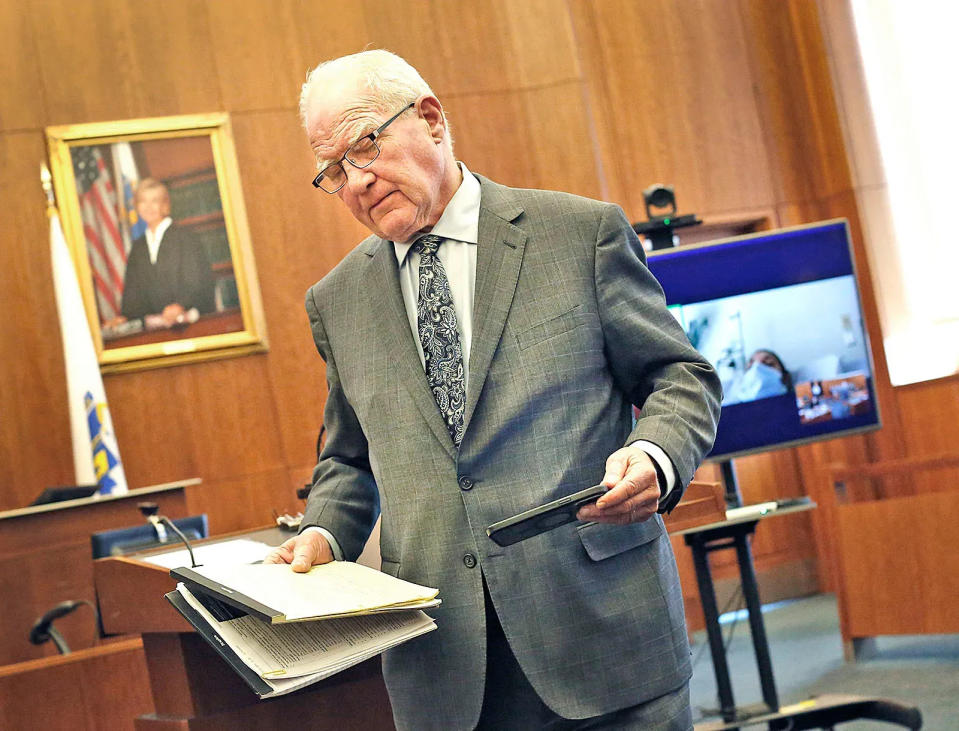Lindsay Clancy pleads not guilty to killing her 3 kids. Her hearing was from the hospital
Lindsay Clancy, of Duxbury, who is accused of murdering her three children, continues to be held without bail and was committed to Tewksbury Hospital for the next six months after she pleaded not guilty at her arraignment from the hospital Thursday.
To honor his 3 slain kids: Clancy finishes Boston Marathon − and with a big money finish
Her next appearance is scheduled for Dec. 15.
Prosecutors say Clancy, 33, strangled her kids Jan. 24 and then took a phone call from her husband after she sent him out to CVS before he picked up dinner in North Plymouth in what prosecutors alleged at the hearing was a deliberate plan to get him out of the house.
During the arraignment, it was revealed that while Lindsay Clancy was on several anti-depressant and related medications, the levels of some of the medications were on the low end of expected levels when her blood was collected at South Shore Hospital.
Two other medications showed peak levels at the time, which prosecutors said was an indication of her having taken them after the killings.
She was indicted last month for killing her children, Cora, 5, Dawson, 3, and Callan, 8 months. She is charged with with three counts each of murder and strangulation.

Clancy has remained hospitalized with injuries she suffered after the killings when she fell from a second-floor bedroom window of the home at 47 Summer St. after holding onto the ledge before either losing her grip or letting go, prosecutors said.
She had cuts to her wrists and neck, which were not life threatening, prosecutors said. A bloody knife was found on the nightstand by her window.
Her lawyer, Kevin Reddington, said the fall left her paralyzed, and she appeared in a wheelchair during the arraignment. While able to speak and move her head, it is unclear how much of her body suffered paralysis.
The two older children were taken to Beth Israel Deaconess Hospital-Plymouth and pronounced dead. Callan Clancy was flown to Boston Children's Hospital, where he died soon after.
Clancy had searched "ways to kill" and "can you treat a psychopath?" online before the children's deaths, according to police and prosecutors.
The chief medical examiner said the children died from asphyxia. Exercise bands were used to strangle them, authorities said. Bands were collected from the home, according to police records.
Prosecutors, defense paint 2 different pictures of Lindsay Clancy
An evaluation of Clancy conducted at Rhode Island Hospital after the killings determined she did not have clinical postpartum depression and instead classified her as having general anxiety disorder, a catchall term encompassing any number of anxiety and depression symptoms.
Reddington, who said in May that his client did have postpartum, disputed the contradicting evaluation.
“It’s a joke,” he said of the hospital’s diagnosis.
He said both Lindsay and Patrick’s parents had stayed at the home for weeks to help the couple take care of the kids and keep an eye on Lindsay.
“She was unable to function in the home and out of his house,” he said, adding that as a nurse, Lindsay Clancy knew how to keep track of medication records.

“Because she knew how to take notes in the journal doesn’t mean she wasn’t suffering,” he said.
The prosecution countered that Lindsay Clancy had been able to function normally the day of the killings, playing with her children outdoors and taking one of them to a pediatrician’s appointment.
They said she had searched the distance from the home to ThreeV restaurant in North Plymouth even though they had gotten food from there multiple times, in order to give her a timeline in which to commit the killings after her sending her husband out on errands.
“She did not take advantage of a situation,” Assistant District Attorney Jennifer Sprague said. “She created it.”
Prosecutors further noted that fatal strangulation takes several minutes and requires sustained pressure, even after someone passes out.
Dawson, they said, showed physical signs of more damage from the strangulation than his siblings did, including more severe bruising and discoloration around his face and neck.
“Dawson struggled or fought more for life, or (Clancy) strangled him harder, or both,” Sprague said. “She could have stopped at any time. She could heave helped at any time, but she did not.”
A doctor was asked to evaluate Lindsay Clancy's most recent mental state, which showed her to still be depressed with non-specifical ideations, a flat affect, flashbacks to the killings and an overall sense of hopelessness and worthlessness.
Both sides agreed during the arraignment that, at a minimum, she continues to present a danger to herself if not others.
Documents unsealed in Clancy case
Nearly 300 pages of documents released Tuesday include almost a dozen search warrants that were previously kept confidential.
The warrants covered a search of the Summer Street home, where DNA was collected from Lindsay's clothing and fingernails, along with several suspected blood stains on the floor and other areas of the home. Blood and urine samples were taken from her at the hospital.
Police also collected laptops and tablets from the home, along with Lindsay's iPhone. Police received permission from the court to bring in forensic experts to review the devices' contents.
Police discovered notebooks in the home belonging to Clancy's that kept track of her medications and included entries describing her thoughts of suicide, according to court documents.
Patrick Clancy recalls the night
Patrick and Lindsay Clancy had been married for six years at the time of the children's deaths.
Patrick told police they had "an amazing marriage" and "got along great," although he was well aware of her mental health struggles, even if not the full extent.
He told police he had been in the house with his wife all day. He said he did not notice her acting in any way that day to suggest what he would come home to after going to CVS and picking up a dinner order at ThreeV restaurant in North Plymouth.
He said he came home and found the house unusually quiet. He went up to their bedroom, where he saw a bloody knife on a nightstand next to an open window.
He ran outside the house and discovered his wife lying face up the ground and unresponsive, at which point he called 911, according to the police report.
When police arrived, they said Patrick Clancy called out to them from where his wife was on the ground.
The police report details how Patrick Clancy then went inside the home and to the basement, which was used as a weight room, office and living room.
The officers reported hearing screaming when Patrick Clancy discovered his children unresponsive in the basement.
The police report said Patrick Clancy could be heard saying, "Oh, my God. Oh, my god," and "She killed the kids."
Documents released: Read the 300 pages for yourself
Lindsay Clancy searches 'ways to kill' amid medication struggle
Reddington, said in May that Clancy suffers from postpartum depression and was overmedicated at the time.
While the postpartum diagnosis is not referenced in the court dockets, Patrick Clancy told police his wife began experiencing anxiety ahead of her planned return to work as a labor and delivery nurse at Massachusetts General Hospital following her maternity leave.
Lindsay Clancy kept written track of the numerous anti-depression and anti-anxiety medications she had been put on at various times. The list included Valium, trazadone, Klonopin, Prozac, Seroquel and lorazepam, according to the documents.
At the time of the children's deaths, she was on four of those medications. Police said that she appeared to be taking them as prescribed.
Patrick Clancy told police he felt she was put on too may medications, a number of which can have the unintended effect in some people of worsening depression symptoms to the point where suicidal thoughts may occur.
"Lindsay had the worst side effects possible" from the medications, he told police.
Patrick Clancy said she told him the month before the killings that she had been having thoughts of hurting herself and the children. He said she checked herself in to McLean Hospital for psychiatric evaluation from Jan. 1-5.
Her behavior was concerning enough to her husband that he began confiding in a college friend of 10 years with whom he had almost daily in-person and online contact, Patrick Clancy told police in an interview.
According to the police interview with the friend, Patrick Clancy worried that his wife was also suffering withdrawal symptoms from going off some of the medications.
The friend and his wife had hosted the couple for a dinner at their home the weekend before the killings.
The friend was surprised she had come given the depression and isolation issues Patrick Clancy had told him about, according to the police interview.
Like Patrick Clancy, the friend noticed she was withdrawn but otherwise seemingly in a non-dangerous state of mind.
He told police his wife appeared to be "fairly normal" and "mostly quiet, on the phone keeping to herself."
This article originally appeared on The Patriot Ledger: Duxbury mother Lindsay Clancy pleads not guilty to killing her 3 kids

